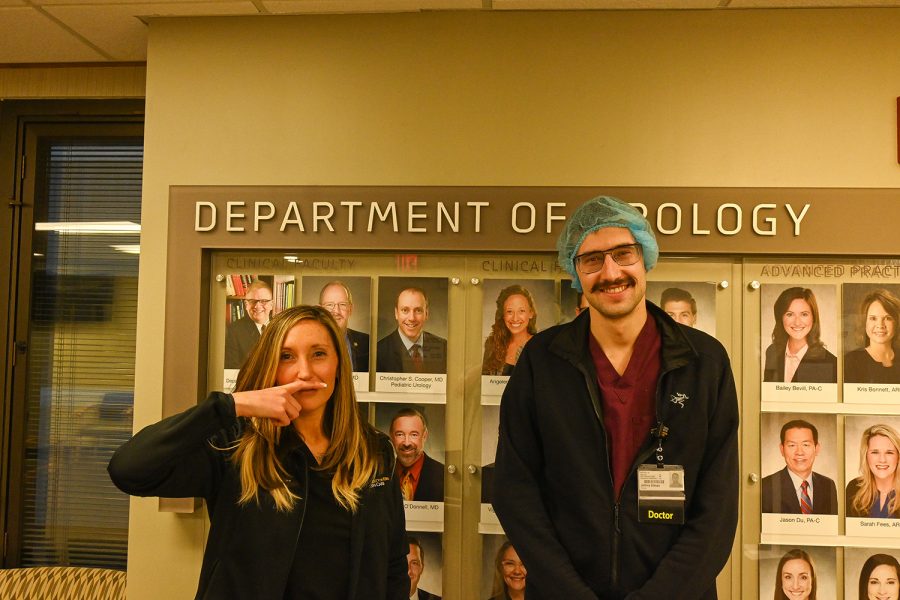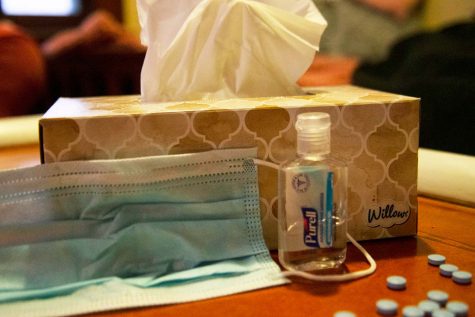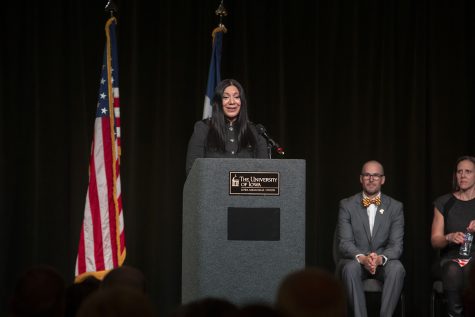University of Iowa Hospitals and Clinics raises awareness for men’s health with Beard Up!
University of Iowa Hospitals and Clinics is raising awareness for men’s health during Movember, where people are encouraged to grow beards and mustaches to support the Beard Up! campaign.
Two doctors show off their mustaches for BeardUP!, November 7, 2021. They and other doctors participate in this tradition every November to promote men’s health.
November 11, 2021
University of Iowa Hospitals and Clinics is participating in Beard Up!, a men’s health campaign, to raise awareness for men’s physical and mental well-being during November — Men’s Health Awareness month.
Often referred to as “Movember” or “No Shave November,” the campaigns are to remind people about the importance of raising awareness for men’s health, specifically prostate and testicular cancer and mental health.
Amy Pearlman, UI Carver College of Medicine clinical assistant professor of urology and the director of men’s health at UIHC, said men mostly struggle with where to go when experiencing health problems.
“Most places don’t have mandatory men’s health training, so they can’t provide patients with detailed information,” Pearlman said.
Since men aren’t sure where to go or are ashamed to talk about difficulties with physical or mental health, Pearlman said many turn to online sources for information.
“When a man comes in for health care, they can sometimes feel embarrassed to verbalize issues like erectile dysfunction,” Pearlman said. “Men should get comfortable with their bodies and talking about their genitals.”
This is why Pearlman and her team are dedicated to improving access to men’s health and increasing awareness around it, she said.
“There’s no milestone in a man’s life that means they need to seek health care, whereas with women they are expected to see a gynecologist at a certain age,” Pearlman said. “We are working on figuring out what a male milestone would look like — maybe when he starts puberty.”
Pearlman said she’s working on a pilot program with fraternities to help young men understand their bodies and when to seek medical care.
One issue for men is prostate and testicular cancer.
Although cancer can be frightening, both kinds of cancer are very treatable, especially when detected early, said Yousef Zakharia, UI Carver College of Medicine clinical associate professor of internal medicine in hematology, oncology, and blood and marrow transplantation.
“Some men come very frightened, especially when they are younger. Chemotherapy is very helpful, and the cancers are highly curative if detected early or late,” Zakharia said. “The best thing for men to do is to show up to their appointment and not shy away from doctors.”
Cancer is life-changing, which is why it takes a team of medical professionals, including psychiatrists to help men navigate this stage of their life, Zakharia said.
“Cancer is not fun to deal with, but it’s not the end of life, just a new commitment and new life,” he said. “Having medical professionals in psychiatry and psychology screen our patients early on makes a huge difference in their lives and a significant impact on their cancer journey.”
Another issue — one that often gets overlooked — is mental health.
According to Mental Health America, over six million men suffer from depression each year, which often goes undiagnosed.
Men account for an estimated 10 percent of patients with anorexia or bulimia and an estimated 35 percent of those with binge-eating disorder, according to Mental Health America. Men with eating disorders are less likely to see professional help than women.
Emad Abou-Arab, UI Carver College of Medicine clinical assistant professor of family medicine, said there’s no right time to address mental health concerns, and men should seek help as soon as possible.
“The biggest thing is to make sure that men are aware that it’s OK to address things with your physical and mental health,” Abou-Arab said. “I commend the guys who see me for taking the step to address their mental health and talk about their significant mental hurdles with a stranger.”
During this month, many physicians at UIHC are growing mustaches and beards to support the Beard Up! campaign, including Abou-Arab.
Pearlman said this campaign hopes to increase awareness and encourage men to seek the help they need.
“Men’s health is critical, and we need to do better as health care providers to learn how to take care of men’s health,” she said. “Nurses and nurse practitioners need to be taught how to care for men, and we need more people to acknowledge that mental health is health.”




















